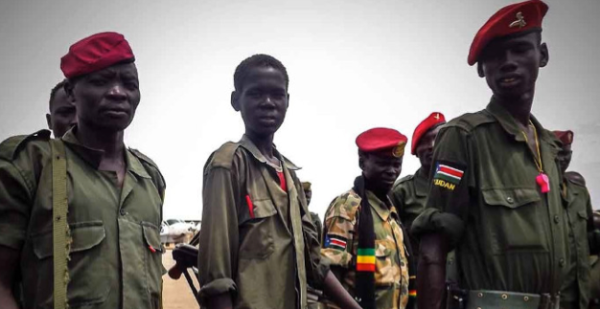
South Sudan’s army has used child soldiers during recent fighting against opposition forces in violation of international law. Since the current conflict began in December 2013, both the government and opposition have recruited and deployed children in their forces.
The government began using child soldiers in recent fighting in mid-August 2014 in Bentiu, the capital of the Unity State. Ten fleeing members from the areas related to Human Rights Watch that they saw dozens of children in military uniform, armed with assault rifles, deployed with government soldiers as well as firing on opposition positions. As recently as August 12, Human Rights Watch stated they observed 15 soldiers who appeared to be children stationed around the government’s Rubkona military base and airstrip.
Daniel Bekele, the Africa director at Human Rights Watch stated, “South Sudan’s army has returned to a terrible practice, once again throwing children into the battlefields.”
Disturbing reports from boys detailed their experiences with the government Sudan People’s Liberation Army (SPLA) such as a 12-year-old boy who was ordered with other children by a solider to shoot at the opposition forces.
South Sudan army and government officials admitted to Human Rights Watch that they did use children under 18. However, these officials went so far as to claim that the children came to them looking for protection and work since the conflict began. It is hard to believe that children as young as 12 would leave their families and place themselves in such a dangerous environment.
While no exact numbers are available at this time, observers and officials have reported that government forces have at least 60 children in their forces in Betui and Rubkona. In addition, the South Sudan Liberation Army, a former rebel group absorbed into the SPLA last year, recruited hundreds of child soldiers who were never formally demobilized.
Since 2003, the SPLA has been listed by the United Nations secretary-general on his annual “list of shame” of governments and non-state groups using children as soldiers. South Sudan’s 2008 Child Act forbids the use of children as soldiers and in March of 2012 even went as far as to sign a plan with the UN to make a commitment to end all use of child soldiers under the age of 18. With progress having been made by the SPLA by the end of 2013 in ending the use of child soldiers, this leads me to wonder why this practice is still occurring. More importantly why are there not stronger laws in place prohibiting throwing these children onto the battlefield?
Opposition forces have also used child soldiers, violating the laws of war as during the first day of fighting in December of 2013, they forcibly recruited hundreds of children from two schools.
Pursuant to the laws of war, the recruitment or use of child soldiers under the age of 15 by parties to a conflict is a war crime. There are currently 156 countries that have ratified an international treaty that prohibits the use of children under 18 by government or non-stated armed forces.
Bekele states “Tens of thousands of children are living in hell inside the UN base because they are not safe outside from attacks on civilians or from being forcibly recruited.” In order to stop this travesty, the government needs to remove these children from their ranks and return them to their families.
What do you think about this issue? How do you think we can stop governments from using children in war?
Source: Human Rights Watch South Sudan Child Soldiers Thrust into Battle
Bloomberg South Sudan’s Army Using Child Soldiers in Conflict
I believe that the only way to stop the recruitment of children as soldiers is to criminalize the practice. All countries, or at least the majority of them, have to join forces to create laws against using children as weapons. The United Nations is currently working on doing that by launching a campaign and developing action plans. The hope is to end the recruitment and use of child soldiers by 2016. The issue in my opinion is the enforcement of the action plans, assuming that they become part of international customary law. The fact that a law becomes a custom does not mean that all governments feel obligated to follow it. Yes, putting child protection laws in place is the first step, but there also has to be a clear plan for their enforcement. If the government and officials in South Sudan claim, that the reason for them using children as soldiers is because they asked for a job, what is going to prevent them from using such excuses? The most obvious answer would be strict penalties for violating the law.
Although it is an extremely slow march towards the enforcement of Article 8(2)(e)(vii) of the Rome Statute, military leaders and politicians are beginning to face legal and criminal consequences for enlisting “children under the age of fifteen years into armed forces”. The International Criminal Court (ICC) has consistently found military leaders responsible for committing war crimes ever since the first major international criminal proceeding against Sam Hinga Norman, former leader of the Mende Tribe in Sierra Leone, in 2004. This major victory has served as a legal basis to convict several military leaders and corrupt politicians for war crimes, more specifically for using child soldiers. From there, amongst the few that have been found responsible for committing such crimes is the infamous Thomas Lubanga Dyilo, former leader of the Union of Congolese Patriots, in the Democratic Republic of the Congo (convicted in 2012). Similarly, Charles Taylor, former Liberian President, was charged and convicted in 2012 by the Special Court for Sierra Leone for facilitating, aiding and abetting a number of crimes, including conscription of child soldiers.
It is important to note the importance of such landmark cases in order to set precedents in the international legal world, which will (hopefully) make this a violation of customary international law.